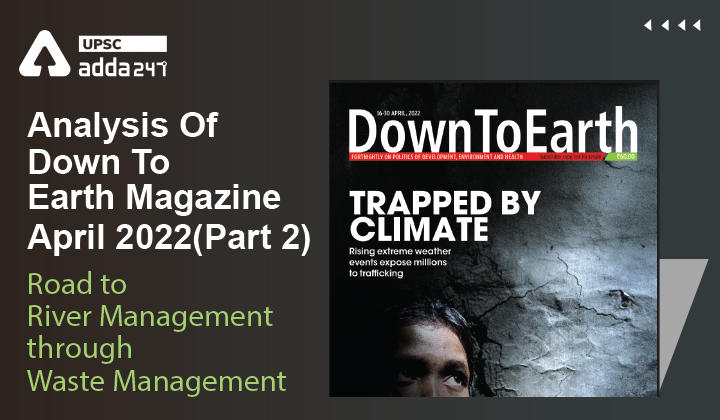Table of Contents
Analysis Of Down To Earth Magazine
”Road to River Management through Waste Management”
Relevance
”GS 3: Environmental Pollution & Degradation”
Context
- In these climate-risked times, we need to recognise the urgency of treating the sewage of our cities so our rivers are not polluted.
- We need to manage this stress, not only by capturing the rain in millions of water bodies but also by making sure that not a single drop of water gets polluted.
- The National Water Policy (2012) recommends that recycle and reuse of water should become the general norm.
How poor urban sanitation pollutes rivers?
- The excreta sums of different cities, or what we call the city’s “shit-flow” diagram, show that the situation is grim.
- Our cities do not treat or safely dispose of the bulk of the human excreta. This is because we often confuse toilets with sanitation.
- The fact is, toilets are mere receptacles to receive waste; when we flush or pour water, the waste flows into a piped drain, which could be either connected— or more likely not—to a sewage treatment plant (STP).
- This STP could be working, or not. This means, human excreta (and our household waste) is mostly not disposed of safely.
- It is just discharged untreated into the nearest river, lake or drain.
How to reverse the global nitrogen cycle?
- The global nitrogen cycle is being disrupted because we dispose of the nutrient-rich human excreta into water bodies.
- We can return the human excreta back to land, use it as a fertiliser and reverse the nitrogen cycle.
- The faecal sludge, after treatment, can be given to farmers and be used as organic compost.
- It can be treated and mixed with other organic waste, like kitchen waste, and used for biogas, or for manufacturing fuel pellets or ethanol.
About Swachh Bharat Mission-Urban 2.0
- Swachh Bharat Mission-Urban 2.0, launched on 1st October 2021, aims to achieve the vision of ‘Garbage Free Cities’ over the next five years through remediation of legacy dumpsites, construction and demolition waste and plastic waste management.
- Additionally, sustainable sanitation through faecal sludge and used water management will be a key focus under SBM-U 2.0.
Existing Laws
- As per Rules, toxic wastes are not allowed to be discharged into rivers.
- As per the Provisions of Environment (Protection) Act, 1986 and Water (Prevention & Control of Pollution), Act 1974, industrial units are required to install effluent treatment plants (ETPs) and treat their effluents to comply with stipulated environmental standards before discharging into river and water bodies.
- Provisions of Hazardous and Other Waste (Management & Transboundary Movement) Rules, 2016 and amendment made thereof under the Environment (Protection) Rules, 1986.
- Accordingly, Central Pollution Control Board (CPCB), State Pollution Control Boards (SPCBs) and Pollution Control Committees (PCCs) monitor industries with respect to effluent discharge standards and take action for non-compliance under the provisions of these Acts.
What needs to be done?
- Toxic waste or hazardous waste generated from hazardous waste industries is required to be disposed off in an environmentally sound manner.
- It is the responsibility of the States/Union Territories (UTs), Local Bodies and Industrial Units to ensure required treatment of sewage and industrial effluents to the prescribed norms before discharging into rivers and other water bodies, coastal waters or land to prevent and control of pollution therein.
- Setting up of sewage treatment plants (STPs) for treatment of waste water should be an integral and major component of river conservation /rejuvenation programmes.
- Sewerage infrastructure including STP should continuously be created under programs like Atal Mission for Rejuvenation & Urban Transformation (AMRUT) and Smart Cities Mission of the Ministry of Housing & Urban Affairs.
Conclusion
The bottom line is that we cannot manage our rivers sustainably unless we fix our system of waste management. Our water future depends not only on our water wisdom but also on our waste wisdom.



 TSPSC Group 1 Question Paper 2024, Downl...
TSPSC Group 1 Question Paper 2024, Downl...
 TSPSC Group 1 Answer key 2024 Out, Downl...
TSPSC Group 1 Answer key 2024 Out, Downl...
 UPSC Prelims 2024 Question Paper, Downlo...
UPSC Prelims 2024 Question Paper, Downlo...




